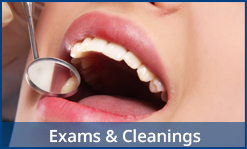The enamel is the very outer layer of the tooth surface. This material is remarkably strong. In fact, enamel is actually harder than bone! Knowing that, it may be surprising to learn that it’s very common for enamel to become eroded. We constantly expose our tooth enamel to whatever foods and drinks we consume, and that can often include sugar and acids, both of which damage enamel over time. Most concerning of all is the fact that once enamel is gone, it does not grow back!
What Causes Enamel Erosion?
We’ve already mentioned how acidic foods and drinks can damage enamel. The same holds true for carbonated beverages and drinks that contain caffeine. Certain medications can make you more prone to enamel erosion as well, as can teeth grinding (also known as bruxism).
Symptoms of Enamel Erosion
If your enamel is badly eroded, it will be obvious. Your teeth will become discolored – often turning a yellowish color. Once this happens, tooth-whitening products won’t work to restore your teeth to a more natural white hue, since whitening agents only work on the enamel layer of the tooth. Your teeth will also become more sensitive to hot and cold foods and drinks, since the enamel layer that protects the rest of the truth structure has been compromised. This can also mean that your teeth will become more prone to cracking or breaking. It’s easy to see why your enamel is so important to good oral health!
Treating Eroded Enamel
Now for the good news: if your enamel has minor damage, there are actually products available today than can help to repair tiny abrasions in the enamel, strengthening whatever enamel you have left. Using products that contain calcium and fluoride can help to remineralize the tooth surface and strengthen whatever enamel is remaining. Look for toothpastes that are specially designed to help remineralize teeth and reduce sensitivity.
Avoid foods and drinks that are acidic and can result in further damage to the enamel. This includes some fruits and fruit juices, as well as wine, coffee and tea. If and when you do indulge in these foods and drinks, rinse your mouth out with water immediately afterward to wash away acidic particles.
If you grind your teeth, your dentist can help you to address this issue as well. Mouth guards worn while you sleep can help to reduce the amount of damage done to your enamel if you grind your teeth at night. Ask your dentist what other steps you can take to save whatever enamel you have left on your teeth surface.











